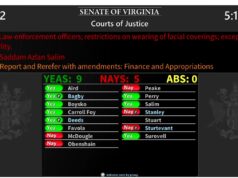This piece ran as my weekly newspaper op/ed in my very red congressional district (VA-06).
*********************
Of all the human tragedies that are associated with the issue of abortion, none has had so profound and destructive an impact on our nation as the interminable political conflict that’s been raging over the issue for decades.
Despite the American people’s debating the issue of abortion for nearly half a century –one side wanting the government to make abortion illegal and the other side wanting decisions on abortion to be made privately by the individuals involved – the disagreements remain unresolved.
Neither the side opposing abortion – believing there is “innocent human life” that needs protection – not the side that wants the coercive power of the government to stay out – that won’t accept being compelled to live according to other people’s beliefs and values – gives any sign of yielding.
Even a decision by today’s Supreme Court to overturn Roe v. Wade would not end the struggle.
The costs to the nation of this unending battle have been horrendous. The passions aroused, and the divisions created, in the American people over abortion have substantially disabled the American people from working together cooperatively to advance those interests and values that they have in common. More than any other issue, it has helped powerful interests hijack the American government to serve themselves at the people’s expense.
(That crippling of the ability of the people as a whole to come together is especially due to the nature of the political culture of the anti-abortion side, for two reasons: first, the “pro-life” movement has generated a great many “single-issue” voters—i.e. people who support whatever candidate or a party agrees with their opposition to abortion (regardless of what else they do); and second, many of these same people perceive those who disagree with them on abortion as moral monsters, “baby-killers,” people so evil that joining forces with them on other issues is unthinkable.)
Unless something shifts, this battle will continue to do such damage.
But what can or should shift?
First, it is important we understand the nature of this disagreement.
It’s not a basic moral disagreement, e.g. where one side opposes “murder” while the other side is OK with it. No one on the side favoring “a woman’s right to choose” would ever approve a parent’s killing an infant, or toddler, or child. All agree those would be murder, and all would oppose such a crime.
The disagreement, rather, is over the question: At what point in human development (from conception onward) does a human being become “endowed by their Creator with certain inalienable rights,” including the right to life?
On that question, there can be no scientific, factual answer. Generally, it depends on beliefs of a religious nature.
(We can see that religious foundation in the arguments that are often made by the side that opposes any “right” of women to choose abortion—arguments framed in terms of the “soul,” using quotes from the Bible.)
America’s founders understood that religious disagreements are of a special nature, posing an especial threat to a society’s peace and political health. They inscribed into our very Constitution the principle that Americans will be allowed to live according to their own religious understanding (“freedom of religion”), and that the coercive power of the government will not be used to impose upon all Americans the religious views of some (the “establishment clause.”)
A resolution of the abortion issue would have to take either one of two forms:
Either those whose religious beliefs say it should be forbidden would be able to compel other people to obey religious beliefs they don’t hold. Or all Americans would be permitted to deal with abortion according to their own beliefs.
It is the latter that’s the American way of dealing with religious differences.
At the same time, it’s understandable that this arrangement – which Roe v Wade – would be upsetting to those who believe that the life of the unborn is as sacred as any human life.
But we all have to live in a world where things we abhor go on. And at least other people’s abortions happen outside the public sphere, privately, and do not impinge upon other people. (In this, it is quite unlike the slavery issue of the 19th century.)
In addition, even if it were the many imposing their religious views on the view, it would be un-American. But in this case, it’s a minority (37% who want to ban abortions in all or most cases) that want to impose their views on a large majority (58% who want abortion to be legal in all or most cases.)
But most of all, without such a resolution, this political war – which otherwise cannot end – will continue to have a disastrous impact on our politics. So even if the “pro-life” people are morally right about abortion, their waging a political war over the issue is wrong for America.



![[UPDATED 1/29/26] Audio: Sen. Tim Kaine Talks to Blue Virginia About His “Five-Point Plan” to Fight Trump’s Orban-Like Assault on US Democracy; Civil Disobedience a la MLK Jr.; Trump’s Bogus “Energy Emergency”; the Crucial Importance of the 2025 VA Elections; etc.](https://bluevirginia.us/wp-content/uploads/2025/02/kaineinterview2-238x178.jpg)

![CNU Wason Center Poll of Virginia: Trump Approval at Just 34%; “narrow majority support a constitutional [redistricting] amendment”](https://bluevirginia.us/wp-content/uploads/2026/01/wason0128-1-238x178.jpg)




![[UPDATED 1/29/26] Audio: Sen. Tim Kaine Talks to Blue Virginia About His “Five-Point Plan” to Fight Trump’s Orban-Like Assault on US Democracy; Civil Disobedience a la MLK Jr.; Trump’s Bogus “Energy Emergency”; the Crucial Importance of the 2025 VA Elections; etc.](https://bluevirginia.us/wp-content/uploads/2025/02/kaineinterview2-100x75.jpg)

